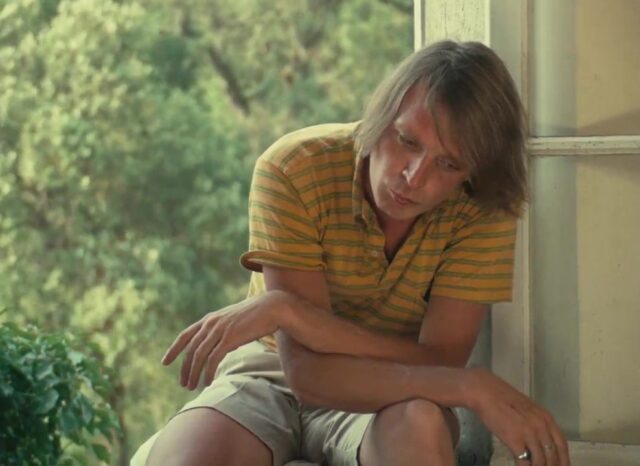
The film career of French artist Daniel Pommereulle is being celebrated at Metrograph this month
SIX MORAL TALES: LA COLLECTIONNEUSE (Eric Rohmer, 1967)
Metrograph
7 Ludlow St. between Canal & Hester Sts.
Saturday, September 14, 2:30
Sunday, September 15, 11:00 am
Series runs September 13-29
212-660-0312
metrograph.com
On September 12, the exhibit “Daniel Pommereulle: Premonition Objects” opens at Ramiken on Grand St. On September 13, Metrograph kicks off the two-week series “One More Time: The Cinema of Daniel Pommereulle,” consisting of seven programs featuring the French painter, sculptor, filmmaker, performer, and poet who died in 2003 at the age of sixty-six. First up is “Daniel Pommereulle X3,” bringing together Pommereulle’s shorts One More Time and Vite and Anton Bialas and Ferdinand Gouzon’s 2021 Monuments aux vivants, which documents the artist’s sculptural work; curators Boris Bergmann and Armance Léger will take part in a postscreening Q&A moderated by filmmaker Kathy Brew. “Pommereulle was one of those people who could stand firm against the all-consuming metropolis: someone who never compromised, who never sold his soul — even to America. We joyously return Pommereulle to New York: a necessary encounter, a poetic reward,” Léger and Bergmann said in a statement. The festival also includes Jean-Luc Godard’s Weekend, Jean Eustache’s The Mother and the Whore, Marc’O’s Les Idoles, Jackie Raynal’s Deux Fois, serge Bard and Olivier Mosset’s Ici et maintenant and Fun and Games for Everyone, and Eric Rohmer’s La Collectionneuse.
“Razor blades are words,” art critic Alain Jouffroy tells painter Daniel Pommereulle (Daniel Pommereulle) in one of the prologues at the start of La Collectionneuse, the fourth film in French master Eric Rohmer’s Six Moral Tales (falling between My Night at Maud’s and Claire’s Knee). Words might have the ability to cut, but they don’t seem to have much impact on the three people at the center of the film, which offers a sort of alternate take on François Truffaut’s Jules et Jim. Needing a break from his supposedly strenuous life, gallerist Adrien (Patrick Bauchau, who also appeared in La Carrière de Suzanne, Rohmer’s second morality tale) decides to vacation at the isolated St. Tropez summer home of the never-seen Rodolphe. Daniel is also at the house, along with Haydée (Haydée Politoff), a beautiful young woman who spends much of the film in a bikini and being taken out by a different guy nearly every night. Adrien decides that she is a “collector” of men, and the three needle one another as they discuss life and love, sex and morality, beauty and ugliness. Adrien might claim to want to have nothing to do with Haydée, but he keeps spending more and more time with her, even though he never stops criticizing her lifestyle. He even uses her as a pawn when trying to get an art collector named Sam (played by former New York Times film critic Eugene Archer under the pseudonym Seymour Hertzberg) to invest in his gallery.
While everybody else in the film pretty much knows what they want, Adrien, who purports to understand life better than all of them, is a sad, lost soul, unable to get past his high-and-mighty attitude. Rohmer crafted the roles of Daniel and Haydée specifically for Pommereulle and Politoff, who improvised much of their dialogue; Bauchau opted not to take that route, making for a fascinating relationship among the three very different people. La Collectionneuse is beautifully shot in 35mm by Néstor Almendros, the bright colors of the characters’ clothing mixing splendidly with the countryside and ocean while offering a striking visual counterpoint to the constant ennui dripping off the screen. His camera especially loves Politoff, regularly exploring her body inch by inch. The film is both Rohmer’s and Almendros’s first color feature; Almendros would go on to make more films with the director, as well as with Truffaut, even after coming to Hollywood and shooting such films as Days of Heaven, Kramer vs. Kramer, and Sophie’s Choice. Winner of a Silver Bear Extraordinary Jury Prize at the 1967 Berlinale, La Collectionneuse is screening September 14 and 15 at Metrograph.
[Mark Rifkin is a Brooklyn-born, Manhattan-based writer and editor; you can follow him on Substack here.]
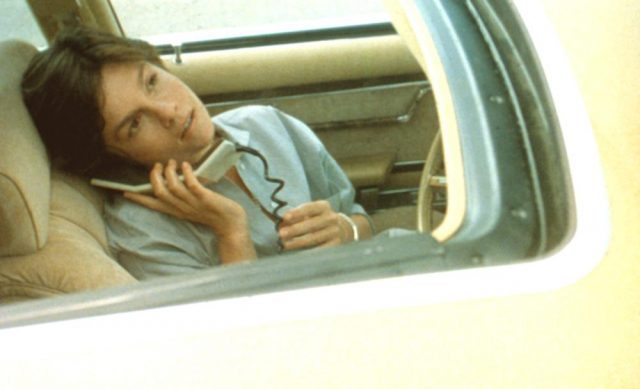
 The Quad is celebrating French-Canadian actress Geneviève Bujold’s seventy-fifth birthday with the wide-ranging fourteen-film retrospective “The Beguiling Bujold,” running August 10-16. The Montreal native was on the cusp of becoming a major star after a 1968 Emmy nomination for playing Joan of Arc in Saint Joan and an Oscar nod the next year for her portrayal of Anne Boleyn in Anne of the Thousand Days, but she opted for a more quirky career of small, independent films, dotted with a handful of bigger pics. One of her best roles is Dr. Nancy Love in 1984’s Choose Me, the first of three consecutive films she made with Alan Rudolph. Nancy hosts a popular radio talk show about love and sex, two things she doesn’t enjoy much of herself until she meets Eve (Lesley Ann Warren), a lounge owner who goes home with a different person every night and is a regular caller into her program under a fake name. Among the men enamored of Eve are her bartender, Billy Ace (John Larroquette); the mean-spirited, married, well-connected Zack (Patrick Bachau); and the new guy in town, Mickey (Keith Carradine), who has lived a rather complicated life. Meanwhile, barfly Pearl (Rae Dawn Chong) has the hots for Mickey too. As part of her “research,” Nancy moves in with Eve, but neither knows that they actually talk to each other almost daily on the radio. Bujold is an intoxicating adult ingénue in Rudolph’s darkly comic tongue-in-cheek noir that features a riotous soundtrack by Teddy Pendergrass and Luther Vandross and lurid photography by Jan Kiesser. Choose Me is screening August 10 and 13 as part of both “The Beguiling Bujold” and “Quadrophilia,” the latter consisting of films relating to the LGBTQ community.
The Quad is celebrating French-Canadian actress Geneviève Bujold’s seventy-fifth birthday with the wide-ranging fourteen-film retrospective “The Beguiling Bujold,” running August 10-16. The Montreal native was on the cusp of becoming a major star after a 1968 Emmy nomination for playing Joan of Arc in Saint Joan and an Oscar nod the next year for her portrayal of Anne Boleyn in Anne of the Thousand Days, but she opted for a more quirky career of small, independent films, dotted with a handful of bigger pics. One of her best roles is Dr. Nancy Love in 1984’s Choose Me, the first of three consecutive films she made with Alan Rudolph. Nancy hosts a popular radio talk show about love and sex, two things she doesn’t enjoy much of herself until she meets Eve (Lesley Ann Warren), a lounge owner who goes home with a different person every night and is a regular caller into her program under a fake name. Among the men enamored of Eve are her bartender, Billy Ace (John Larroquette); the mean-spirited, married, well-connected Zack (Patrick Bachau); and the new guy in town, Mickey (Keith Carradine), who has lived a rather complicated life. Meanwhile, barfly Pearl (Rae Dawn Chong) has the hots for Mickey too. As part of her “research,” Nancy moves in with Eve, but neither knows that they actually talk to each other almost daily on the radio. Bujold is an intoxicating adult ingénue in Rudolph’s darkly comic tongue-in-cheek noir that features a riotous soundtrack by Teddy Pendergrass and Luther Vandross and lurid photography by Jan Kiesser. Choose Me is screening August 10 and 13 as part of both “The Beguiling Bujold” and “Quadrophilia,” the latter consisting of films relating to the LGBTQ community.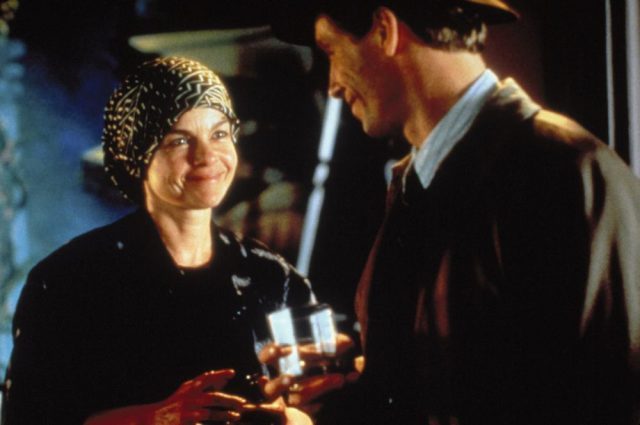
 Bujold comfortably settles into the background in her second film with Rudolph, 1988’s The Moderns, a wickedly sly riff on the Lost Generation in post-WWI Paris. Bujold is gallery owner Libby Valentin, the guiding conscience among the self-important literati, including Ernest Hemingway (Kevin J. O’Connor), who speaks in hysterical quotations that would wind up in The Sun Also Rises and other books; Gertrude Stein (Elsa Raven), and Alice B. Toklas (Ali Giron), who host high-falutin’ salon gatherings; gossip columnist Oiseau (Wallace Shawn), who never a met a story he couldn’t make up; wealthy art collector Nathalie de Ville (Geraldine Chaplin), who has more up her sleeves than she initially lets on; powerful, jealous businessman Bertram Stone (John Lone) and his wife, the sexy, troublesome Rachel (Linda Fiorentino); and expatriate painter Nick Hart (Keith Carradine), who has little time for nonsense as he homes in on Rachel. The beginning of the film is annoying, pretentious, and self-indulgent, but once it kicks into high gear, it wonderfully pokes fun at itself, especially via Oiseau, played to a comic T by Shawn — who likes to hang out at Bar Sélavy, owned by Rose (Marthe Turgeon), in a sweet homage to Marcel Duchamp. Cinematographer Toyomichi Kurita slowly switches from black-and-white to color as scenes change and the backstabbing heats up. The plot centers around forgeries, referencing the phoniness that resides within every character. The only one who remains steady throughout is Libby, who is played with just the right touch of mystery by Bujold. The Moderns is screening at the Quad on August 10 at 6:45.
Bujold comfortably settles into the background in her second film with Rudolph, 1988’s The Moderns, a wickedly sly riff on the Lost Generation in post-WWI Paris. Bujold is gallery owner Libby Valentin, the guiding conscience among the self-important literati, including Ernest Hemingway (Kevin J. O’Connor), who speaks in hysterical quotations that would wind up in The Sun Also Rises and other books; Gertrude Stein (Elsa Raven), and Alice B. Toklas (Ali Giron), who host high-falutin’ salon gatherings; gossip columnist Oiseau (Wallace Shawn), who never a met a story he couldn’t make up; wealthy art collector Nathalie de Ville (Geraldine Chaplin), who has more up her sleeves than she initially lets on; powerful, jealous businessman Bertram Stone (John Lone) and his wife, the sexy, troublesome Rachel (Linda Fiorentino); and expatriate painter Nick Hart (Keith Carradine), who has little time for nonsense as he homes in on Rachel. The beginning of the film is annoying, pretentious, and self-indulgent, but once it kicks into high gear, it wonderfully pokes fun at itself, especially via Oiseau, played to a comic T by Shawn — who likes to hang out at Bar Sélavy, owned by Rose (Marthe Turgeon), in a sweet homage to Marcel Duchamp. Cinematographer Toyomichi Kurita slowly switches from black-and-white to color as scenes change and the backstabbing heats up. The plot centers around forgeries, referencing the phoniness that resides within every character. The only one who remains steady throughout is Libby, who is played with just the right touch of mystery by Bujold. The Moderns is screening at the Quad on August 10 at 6:45.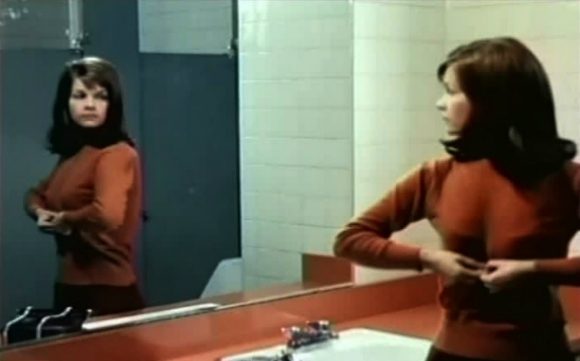
 Bujold made three films with her husband, Paul Almond, during their six-year marriage. In between 1968’s Isabel and 1972’s Journey is the very strange, ultimately unsatisfying The Act of the Heart, which earned Bujold a Canadian Film Award for Best Actress. The low-budget 1970 film hints at being a horror movie, which would have been much better than the rather drab drama it turns out to be, save for a bizarre finale. Bujold is Martha, a shy, devout young woman who has arrived in a small town on the North Shore of Quebec to be a nanny to Russell (Bill Mitchell), a boy being raised by his widowed mother, Johane (Monique Leyrac). Martha auditions for the church choir, which is conducted by Augustinian monk Father Ferrier (Donald Sutherland). As she becomes deeply involved in Billy’s life, which includes his getting seriously injured in a hockey game, she and Father Ferrier take a liking to each other, severely testing their faith. Bujold excels as Martha, as she grows from a church mouse to a woman filled with desire, but Sutherland sleepwalks through the first half of the film, and the subplot with Russell and Johane turns soapy. Still, watching Bujold work her magic is always worth it. Winner of six Canadian Film Awards (Best Director, Best Actress, Best Art Direction, Best Sound Editing, Best Sound, and Best Musical Score), The Act of the Heart is screening August 12 at 5:45 at the Quad. “The Beguiling Bujold” also boasts such other diverse Bujold films as the Michael Crichton medical thriller Coma with Michael Douglas, the Brian De Palma Hitchcock homage Obsession with Cliff Robertson, David Cronenberg’s creepy Dead Ringers with Jeremy Irons, Michael Cacoyannis’s Euripides adaptation The Trojan Women with Katharine Hepburn and Vanessa Redgrave, and Alain Resnais’s The War Is Over with Yves Montand. And as a bonus, the Quad is showing Mark Robson’s Earthquake, starring Bujold with Charlton Heston, Ava Gardner, George Kennedy, Lorne Greene, Richard Roundtree, Walter Matthau, Victoria Principal, et al., on August 20 and 21 in the upcoming
Bujold made three films with her husband, Paul Almond, during their six-year marriage. In between 1968’s Isabel and 1972’s Journey is the very strange, ultimately unsatisfying The Act of the Heart, which earned Bujold a Canadian Film Award for Best Actress. The low-budget 1970 film hints at being a horror movie, which would have been much better than the rather drab drama it turns out to be, save for a bizarre finale. Bujold is Martha, a shy, devout young woman who has arrived in a small town on the North Shore of Quebec to be a nanny to Russell (Bill Mitchell), a boy being raised by his widowed mother, Johane (Monique Leyrac). Martha auditions for the church choir, which is conducted by Augustinian monk Father Ferrier (Donald Sutherland). As she becomes deeply involved in Billy’s life, which includes his getting seriously injured in a hockey game, she and Father Ferrier take a liking to each other, severely testing their faith. Bujold excels as Martha, as she grows from a church mouse to a woman filled with desire, but Sutherland sleepwalks through the first half of the film, and the subplot with Russell and Johane turns soapy. Still, watching Bujold work her magic is always worth it. Winner of six Canadian Film Awards (Best Director, Best Actress, Best Art Direction, Best Sound Editing, Best Sound, and Best Musical Score), The Act of the Heart is screening August 12 at 5:45 at the Quad. “The Beguiling Bujold” also boasts such other diverse Bujold films as the Michael Crichton medical thriller Coma with Michael Douglas, the Brian De Palma Hitchcock homage Obsession with Cliff Robertson, David Cronenberg’s creepy Dead Ringers with Jeremy Irons, Michael Cacoyannis’s Euripides adaptation The Trojan Women with Katharine Hepburn and Vanessa Redgrave, and Alain Resnais’s The War Is Over with Yves Montand. And as a bonus, the Quad is showing Mark Robson’s Earthquake, starring Bujold with Charlton Heston, Ava Gardner, George Kennedy, Lorne Greene, Richard Roundtree, Walter Matthau, Victoria Principal, et al., on August 20 and 21 in the upcoming 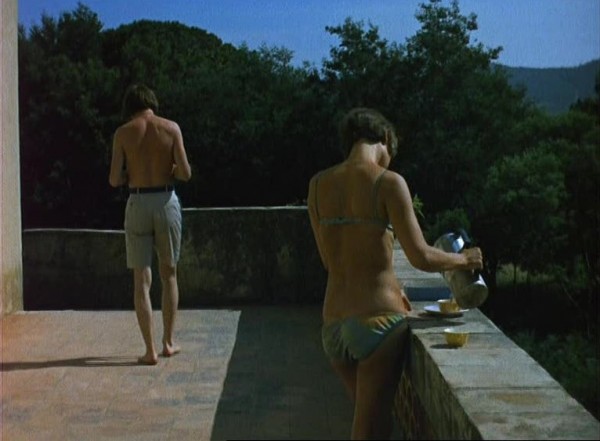
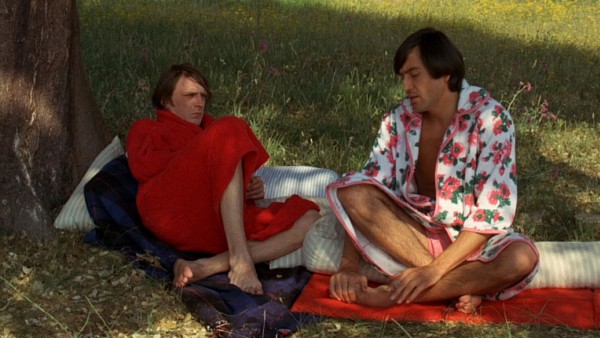
 Nominated for the Palme d’Or and a Best Foreign Language Film Oscar, My Night at Maud’s, Éric Rohmer’s fourth entry in his Six Moral Tales series (falling between La Collectionneuse and Claire’s Knee) continues the French director’s fascinating exploration of love, marriage, and tangled relationships. Three years removed from playing the romantic racecar driver Jean-Louis in Claude Lelouch’s A Man and a Woman, Jean-Louis Trintignant again stars as a man named Jean-Louis, this time a single thirty-four-year-old Michelin engineer living a relatively solitary life in the French suburb of Clermont. A devout Catholic, he is developing an obsession with a fellow churchgoer, the blonde, beautiful Françoise (Marie-Christine Barrault), about whom he knows practically nothing. After bumping into an old school friend, Vidal (Antoine Vitez), the two men delve into deep discussions of religion, Marxism, Pascal, mathematics, Jansenism, and women. Vidal then invites Jean-Louis to the home of his girlfriend, Maud (Françoise Fabian), a divorced single mother with open thoughts about sexuality, responsibility, and morality that intrigue Jean-Louis, for whom respectability and appearance are so important. The conversation turns to such topics as hypocrisy, grace, infidelity, and principles, but Maud eventually tires of such talk. “Dialectic does nothing for me,” she says shortly after explaining that she always sleeps in the nude. Later, when Jean-Louis and Maud are alone, she tells him, “You’re both a shamefaced Christian and a shamefaced Don Juan.” Soon a clearly conflicted Jean-Louis is involved in several love triangles that are far beyond his understanding, so he again seeks solace in church. My Night at Maud’s is a classic French tale, with characters spouting off philosophically while smoking cigarettes, drinking wine and other cocktails, and getting naked. Shot in black-and-white by Néstor Almendros, the film roams from midnight mass to a single woman’s bed and back to church, as Jean-Louis, played with expert concern by Trintignant, is forced to examine his own deep desires and how they relate to his spirituality. Fabian (Belle de Jour, The Letter) is outstanding as Maud, whose freedom titillates and confuses Jean-Louis. My Night at Maud’s, which is being shown September 17-18 and 24-25 as part of the Film Society of Lincoln Center’s Six Moral Tales series, is one of Rohmer’s best, most accomplished works despite its haughty intellectualism.
Nominated for the Palme d’Or and a Best Foreign Language Film Oscar, My Night at Maud’s, Éric Rohmer’s fourth entry in his Six Moral Tales series (falling between La Collectionneuse and Claire’s Knee) continues the French director’s fascinating exploration of love, marriage, and tangled relationships. Three years removed from playing the romantic racecar driver Jean-Louis in Claude Lelouch’s A Man and a Woman, Jean-Louis Trintignant again stars as a man named Jean-Louis, this time a single thirty-four-year-old Michelin engineer living a relatively solitary life in the French suburb of Clermont. A devout Catholic, he is developing an obsession with a fellow churchgoer, the blonde, beautiful Françoise (Marie-Christine Barrault), about whom he knows practically nothing. After bumping into an old school friend, Vidal (Antoine Vitez), the two men delve into deep discussions of religion, Marxism, Pascal, mathematics, Jansenism, and women. Vidal then invites Jean-Louis to the home of his girlfriend, Maud (Françoise Fabian), a divorced single mother with open thoughts about sexuality, responsibility, and morality that intrigue Jean-Louis, for whom respectability and appearance are so important. The conversation turns to such topics as hypocrisy, grace, infidelity, and principles, but Maud eventually tires of such talk. “Dialectic does nothing for me,” she says shortly after explaining that she always sleeps in the nude. Later, when Jean-Louis and Maud are alone, she tells him, “You’re both a shamefaced Christian and a shamefaced Don Juan.” Soon a clearly conflicted Jean-Louis is involved in several love triangles that are far beyond his understanding, so he again seeks solace in church. My Night at Maud’s is a classic French tale, with characters spouting off philosophically while smoking cigarettes, drinking wine and other cocktails, and getting naked. Shot in black-and-white by Néstor Almendros, the film roams from midnight mass to a single woman’s bed and back to church, as Jean-Louis, played with expert concern by Trintignant, is forced to examine his own deep desires and how they relate to his spirituality. Fabian (Belle de Jour, The Letter) is outstanding as Maud, whose freedom titillates and confuses Jean-Louis. My Night at Maud’s, which is being shown September 17-18 and 24-25 as part of the Film Society of Lincoln Center’s Six Moral Tales series, is one of Rohmer’s best, most accomplished works despite its haughty intellectualism.